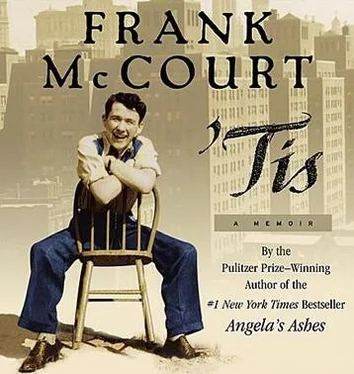Frank McCourt - 'Tis
Здесь есть возможность читать онлайн «Frank McCourt - 'Tis» весь текст электронной книги совершенно бесплатно (целиком полную версию без сокращений). В некоторых случаях можно слушать аудио, скачать через торрент в формате fb2 и присутствует краткое содержание. Жанр: Старинная литература, на английском языке. Описание произведения, (предисловие) а так же отзывы посетителей доступны на портале библиотеки ЛибКат.
- Название:'Tis
- Автор:
- Жанр:
- Год:неизвестен
- ISBN:нет данных
- Рейтинг книги:3 / 5. Голосов: 1
-
Избранное:Добавить в избранное
- Отзывы:
-
Ваша оценка:
- 60
- 1
- 2
- 3
- 4
- 5
'Tis: краткое содержание, описание и аннотация
Предлагаем к чтению аннотацию, описание, краткое содержание или предисловие (зависит от того, что написал сам автор книги «'Tis»). Если вы не нашли необходимую информацию о книге — напишите в комментариях, мы постараемся отыскать её.
'Tis — читать онлайн бесплатно полную книгу (весь текст) целиком
Ниже представлен текст книги, разбитый по страницам. Система сохранения места последней прочитанной страницы, позволяет с удобством читать онлайн бесплатно книгу «'Tis», без необходимости каждый раз заново искать на чём Вы остановились. Поставьте закладку, и сможете в любой момент перейти на страницу, на которой закончили чтение.
Интервал:
Закладка:
His students said, Yeah, wasn’t it something to see the girls in the hallway, nine girls, nearly three thousand boys and what about the boys in the school, fifty percent for Chrissakes, who didn’t want the girls, what about that? They had to be dead from the waist down, didn’t they?
Then you’d wonder about Mr. Curran himself up there shifting into English to talk about The Iliad and the friendship of Achilles and Patroclus, he couldn’t stop talking about those two old Greeks, and how Achilles was so furious with Hector for killing Patroclus he killed Hector and dragged his body behind his chariot to show the power of his love for his dead friend, the love that dare not speak its name.
But, boys oh boys, is there a sweeter moment in all of literature than that moment when Hector removed his helmet to calm the fears of his child? Oh, if only all our fathers removed their helmets. And when Joe blubbered into his gray handkerchief and used words like piss you knew he’d left the school at lunch hour for a little tot around the corner at the Gashouse Bar. There were days he returned so excited from thoughts that had come to him on the bar stool he wanted to thank God for leading him to teaching so that he could forget the Greeks for a while to sing the praises of the great Alexander Pope and his Ode on Solitude.
Happy the man whose wish and care
A few paternal acres bound
Content to breathe his native air,
In his own ground.
And remember, boys and girls, is there a girl here? raise your hand if you’re a girl, no girls? remember, boys, that Pope was indebted to Horace and Horace was indebted to Homer and Homer was indebted to God knows who. Will you promise on your mothers’ heads to remember that? If you remember Pope’s debt to Horace you’ll know no one springs full-blown from his father’s head. Will you remember?
We will, Mr. Curran.
What am I to tell Joe’s students who complain that they have to read The Odyssey and all this old stuff? Who cares what happened in ancient Greece or Troy with men dying right and left over that stupid Helen? Who cares? Boys in the class say you wouldn’t catch them fighting to the death over some girl that didn’t want them. Yeah, they could understand Romeo and Juliet because a lotta families are dumb about you going out with someone from another religion and they could understand West Side Story and the gangs but they could never believe grown men would leave home the way Odysseus left Penelope and Telemachus and go off to fight over this stupid chick who didn’t know enough to come inside. They have to admit Odysseus was cool the way he tried to dodge the draft, acting crazy an’ all and they like the way Achilles fooled him because Achilles is nowhere near as smart as Odysseus but like they can’t believe he’d stay away twenty years fighting and fooling around and expect Penelope to like sit there spinning and weaving and telling the suitors get lost. Girls in the class say they can believe it, they really can, that women can be true forever because that’s the way women are, and one girl tells the class what she read in a Byron poem, that man’s love is of his life a thing apart, ’tis woman’s whole existence. Boys hoot at this but girls applaud and tell them what all the psychology books say, that boys their age are three years behind in mental development though there are some in this class who must be at least six years behind and they should therefore shut up. The boys try to be sarcastic, raising their eyebrows and telling each other, Oh, law de daw, smell me, I’m developed, but the girls look at each other, shrug, toss their hair and ask me in a lofty tone if we could please get back to the lesson.
Lesson? What are they talking about? What lesson? All I can remember is the usual high school whine about why we have to read this and why we have to read that, and my irritation, my unspoken response, is that you have to read it, goddammit, because it’s part of the curriculum and because I’m telling you read it, I’m the teacher, and if you don’t cut the whining and complaining you’ll get an English grade on your report card that will make zero look like a gift from the gods because I’m standing here listening to you and looking at you, the privileged, the chosen, the pampered, with nothing to do but go to school, hang out, do a little studying, go to college, get into a money-making racket, grow into your fat forties, still whining, still complaining, when there are millions around the world who’d offer fingers and toes to be in your seats, nicely clothed, well fed, with the world by the balls.
That’s what I’d like to say and never will because I might be accused of using inappropriate language and that would give me a Joe Curran fit. No. I can’t talk like that because I have to find my way in this place, a far cry from McKee Vocational and Technical High School.
In the spring of 1972 the English Department chairman, Roger Goodman, offers me a permanent position at Stuyvesant High School. I’ll have my own five classes and a building assignment where, once more, I’ll keep order in the students’ cafeteria and make sure no one drops ice cream wrappers or bits of hot dog on the floor though boys and girls are allowed to sit together here and romance kills appetites.
I’ll have a small homeroom, the first nine girls, seniors and ready to graduate. The girls are kind. They bring me things, coffee, bagels, newspapers. They’re critical. They say I should do something about my hair, let the sideburns grow, this is 1972 and I should get with it, be cool, and do something about my clothes. They say I dress like an old man, and even though I have a few gray hairs I don’t have to look so old. They tell me I look uptight and one of them kneads my neck and shoulders. Relax, she says, relax, we’re harmless, and they laugh the way women laugh when they share a secret and you think it’s about you.
I’ll have five classes a day five days a week where I have to memorize the names of one hundred and seventy-five students along with the names of a full homeroom class next year, another thirty-five, and I’ll have to be particularly careful with the Chinese and Korean students with their sarcastic, That’s okay if you don’t know our names, Mr. McCourt, we all look the same. Or they might laugh, Yeah, and all you white people look the same.
I know all this from my days as a substitute teacher but now I watch my students, my very own, stream into my room this first day of February 1972, feast of St. Brigid, and I’m praying to you, Brigid, because these are kids I’ll be seeing five days a week for five months and I don’t know if I’m up to it. The times they are a-changin’ and you can see these Stuyvesant kids are worlds and years away from the ones I first met at McKee. We’ve had wars and assassinations since then, the two Kennedys, Martin Luther King, Medgar Evers. Boys at McKee wore short hair or pompadours greased back to a duck’s ass. Girls had blouses and skirts and their hair was permed to the stiffness of a helmet. Stuyvesant boys wear hair so long people on the streets sneer, You can hardly tell them from the girls, ha ha. They wear tie-dye shirts, jeans and sandals so that no one will ever guess they come from comfortable families all over New York. Stuyvesant girls let hair and breasts hang loose and drive the boys mad with desire and cut their jeans at the knees for that cool poverty effect because like you know they’ve had it with all that middle-class crap.
Oh, yeah, they’re cooler than the McKee kids because they’ve got it made. In eight months they’ll be at colleges and universities all over the country, Yale, Stanford, MIT, Williams, Harvard, lords and ladies of the earth, and here in my classroom they sit where they like, chatting, ignoring me, giving me their backs, one more teacher obstructing their way to graduation and the real world. Some stare as if to say, Who is this guy? They slump and slouch and gaze out the window or over my head. Now I have to get their attention and that’s what I say, Excuse me, may I have your attention? A few stop talking and look at me. Others look offended at the interruption and turn away again.
Читать дальшеИнтервал:
Закладка:
Похожие книги на «'Tis»
Представляем Вашему вниманию похожие книги на «'Tis» списком для выбора. Мы отобрали схожую по названию и смыслу литературу в надежде предоставить читателям больше вариантов отыскать новые, интересные, ещё непрочитанные произведения.
Обсуждение, отзывы о книге «'Tis» и просто собственные мнения читателей. Оставьте ваши комментарии, напишите, что Вы думаете о произведении, его смысле или главных героях. Укажите что конкретно понравилось, а что нет, и почему Вы так считаете.












